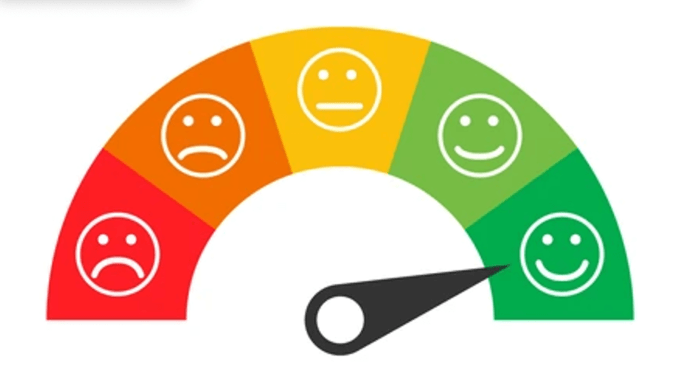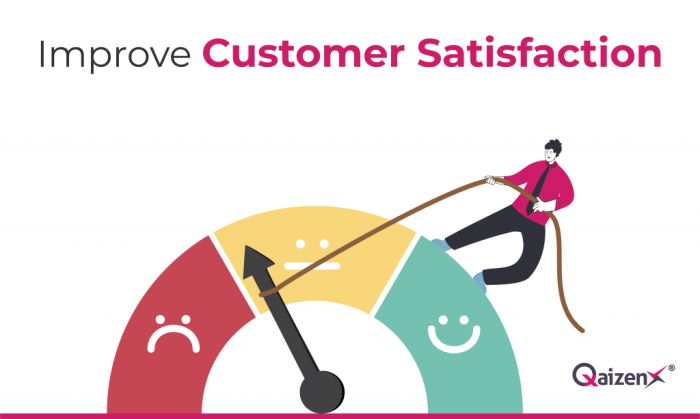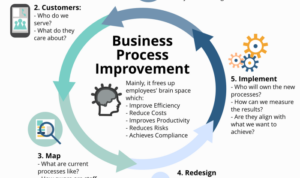Improving Customer Satisfaction takes center stage in this insightful journey towards enhancing business success. Get ready to explore effective strategies, innovative technologies, and the impact of employee training on customer satisfaction in a high-energy narrative.
Let’s dive into the realm of customer satisfaction and uncover the secrets to building strong brand loyalty and driving business growth through exceptional customer experiences.
Importance of Customer Satisfaction
Improving customer satisfaction is crucial for a business as it directly impacts the success and longevity of the company. Satisfied customers are more likely to become repeat buyers, leading to increased revenue and profitability. Additionally, happy customers are more likely to recommend the business to others, resulting in new customers through positive word-of-mouth marketing.
Impact on Brand Loyalty
- Customer satisfaction plays a key role in building brand loyalty among consumers. When customers are satisfied with their experience, they are more likely to develop a strong emotional connection to the brand.
- Brand loyalty leads to repeat purchases, increased customer retention, and ultimately, a higher customer lifetime value. Satisfied customers are less likely to switch to competitors, contributing to the overall success of the business.
Relationship with Business Growth
- Customer satisfaction directly correlates with business growth as it fosters a positive reputation and credibility for the company. Happy customers are more willing to engage with the brand, leading to increased sales and market share.
- By focusing on improving customer satisfaction, businesses can create a loyal customer base that serves as a foundation for sustainable growth and long-term success. Investing in customer satisfaction initiatives is essential for driving business growth and staying competitive in the market.
Strategies for Enhancing Customer Satisfaction

Customer satisfaction is crucial for the success of any business. Implementing effective strategies can help enhance customer satisfaction, leading to increased loyalty and positive word-of-mouth. Here are some key strategies to consider:
Personalized Customer Experiences
Providing personalized experiences to customers can significantly improve satisfaction levels. By understanding individual needs and preferences, businesses can tailor their products or services to meet specific requirements. For example, offering personalized recommendations based on past purchases or interactions can make customers feel valued and appreciated.
Role of Feedback
Feedback plays a vital role in improving customer satisfaction. Encouraging customers to share their thoughts, opinions, and suggestions can provide valuable insights into areas that need improvement. By actively listening to feedback and implementing necessary changes, businesses can show customers that their opinions are valued and taken seriously. This not only enhances satisfaction but also fosters a sense of trust and transparency.
Utilizing Technology for Customer Satisfaction
In today’s digital age, technology plays a crucial role in enhancing customer satisfaction. By leveraging tools like chatbots, CRM software, and social media platforms, businesses can provide better service and build stronger relationships with their customers.
Using Chatbots to Enhance Customer Satisfaction
Chatbots are AI-powered tools that can interact with customers in real-time, providing instant support and assistance. They can answer common queries, guide customers through the purchasing process, and even personalize recommendations based on customer preferences. This not only improves response times but also enhances the overall customer experience.
Benefits of Using CRM Software for Customer Satisfaction, Improving Customer Satisfaction
- Centralized Customer Data: CRM software allows businesses to store and manage customer information in one place, enabling a more personalized approach to customer interactions.
- Improved Communication: With CRM software, businesses can track customer interactions, preferences, and purchase history, allowing for more targeted communication and tailored marketing campaigns.
- Enhanced Customer Service: By having access to a customer’s history and preferences, businesses can provide more efficient and effective support, leading to higher customer satisfaction levels.
Utilizing Social Media Platforms for Improving Customer Satisfaction
Social media platforms serve as powerful tools for businesses to connect with customers, gather feedback, and address concerns promptly. By actively engaging with customers on platforms like Facebook, Twitter, and Instagram, businesses can build relationships, showcase their brand personality, and provide timely support, ultimately enhancing customer satisfaction.
Employee Training and Customer Satisfaction: Improving Customer Satisfaction

Employee training plays a crucial role in ensuring customer satisfaction. When employees are well-trained in customer service skills, they can effectively meet the needs and expectations of customers, leading to higher levels of satisfaction and loyalty.
Importance of Employee Training
Employee training is essential as it equips employees with the necessary skills to handle various customer interactions. Some key skills that employees should possess for better customer satisfaction include active listening, empathy, problem-solving abilities, and effective communication. By training employees in these areas, businesses can ensure that customers feel valued and understood, ultimately leading to improved satisfaction levels.
- Active Listening: Employees should be able to listen attentively to customers’ concerns and feedback without interrupting, showing that their opinions are valued.
- Empathy: Demonstrating empathy towards customers’ situations and emotions can help employees build rapport and trust, leading to enhanced satisfaction.
- Problem-Solving Abilities: Employees should be equipped to handle customer issues effectively and efficiently, finding solutions that meet customers’ needs.
- Effective Communication: Clear and concise communication is key in ensuring that customers receive accurate information and assistance, contributing to overall satisfaction.
Impact of Employee Morale on Customer Satisfaction
Employee morale plays a significant role in customer satisfaction. When employees feel valued, supported, and motivated in their roles, they are more likely to deliver exceptional customer service experiences. High morale leads to increased employee engagement, which translates into better interactions with customers. On the other hand, low morale can result in disengaged employees who may not prioritize customer needs, ultimately leading to lower levels of satisfaction.





